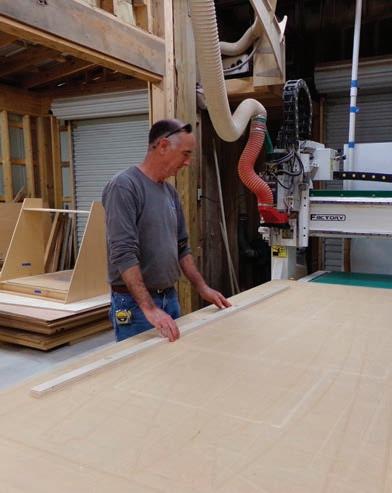
3 minute read
Peace Garden Project grows food and community
40 • Outlook 2021
Peace Garden Project grows food and community
by Summer Stevens
Michelle Lewis, founder of Peace Garden Project, has a unique approach to building community: she starts with food. “Everybody understands food,” she said. “You might not understand racial injustice, so we start with food.”
The organization, started in 2016 in New Rochelle, New York, exists to grow healthy communities through growing food. The fresh fruits and vegetables, grown locally in Manteo, are then given directly to people in need, without any paperwork to fill out or questions asked. Last year the Peace Garden Project partnered with the USDA’s Farmers to Families program to distribute over 145,000 pounds of food. But there’s a lot of learning and community involvement that happens to make this possible.
Lewis and two interns from Duke University mentored a team of middle school and high school students through the Youth Leadership Institute, a six-week program that teaches not only gardening, but leadership skills, art classes and a strong work ethic. The students receive a Chromebook and a $600 stipend. They primarily work at one of the three gardens in Manteo. The main garden, which also houses a greenhouse for starting seeds and growing winter produce, is located at BeachLand Farms on Fannin Mill Road in Manteo. The other two gardens are located on the grounds of private residences in Manteo.
Plans for several more gardens are in the works: on the beach, in Elizabeth and in Currituck. Peace Garden Project is also partnering with Dare County Children and Youth Partnership to create a seven-acre interactive garden for children with an emphasis on learning about wetland species.
Lewis is passionate about community growth. Not physical growth, but relational. “We want to provide safe spaces for people to have hard conversations,” she said. The organization focuses on environmental justice and food justice. “There are issues in every community. But it’s amazing to see what growing food will do to transform a community.”
She recalls the impetus to start the organization five years ago, at the Methodist church where she served as pastor. The relationship between t h e church and its Jewish neighbors had been tenuous for years. After starting the first peace garden on the church grounds, a bridge was formed. Neighbors began to tend the garden. As the crops grew, the relationships healed.
“Counties have been transformed in places where our gardens are located,” Lewis said.
Beyond food distribution, the Peace Garden Project offers workshops, nutrition and cooking classes. There are many ways to get involved. Community members who have a skill to offer – art, dance, business – are encouraged to contact Lewis about teaching a workshop. Donations are always appreciated and can be sent to Peace Garden Project, PO Box 1811, Manteo, NC 27954. For more information or how to get involved, visit online at peacegardenproject.net or email PeaceGardenpr@ g m a i l . com.
























